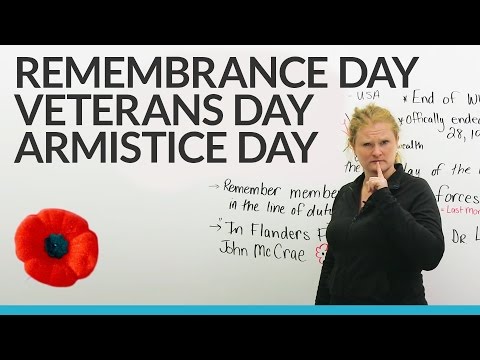Veterans Day & Remembrance Day
 |
Do you know what Veterans Day is? What about Memorial Day? You may have also heard about Remembrance Day or Armistice Day. Find out how and why we celebrate these holidays in this special lesson. I'll teach you some key cultural points that are important to know where this holiday is celebrated. I'll explain a little bit about the history of this holiday and how these names are used in the United States and other English speaking countries. Last but not least, learn some key English vocabulary and expressions we use to talk about Veterans Day.
Take the quiz on this lesson: www.engvid.com/veterans-day-remembrance-day/
TRANSCRIPT
[Airplane flying and crashing noises] Back from the dead. Survived the war. My name's Ronnie. I'm going to teach you something today that is very important in many countries of the world, probably including your country. It commemorates people who fought in the war, World War I, World War II, and what we're doing is we are respecting people who gave their lives for our freedom. Thanks, soldiers.
Have you noticed that when you walk around in November, people are wearing red flowers or a red pin on their jackets? And you may ask yourself: "Why...? Why are people wearing these red...? Is this...? Is this a new brand? What's happened?" What has happened is Remembrance Day. Or if you are living in America, it's called Veteran's Day, and in other countries of the world it's called Armistice Day. This day is November 11th.
So, what happens on November 11th at 11am is we have what's called one minute of silence. That means at exactly 11am for one minute we do not speak, because we are remembering men and women who died in the wars. So, we have a very special way to say this, we say: "The 11th hour"-which is 11am-"of the 11th day of the 11th month". So this is November 11th at 11am. You might think: "Well, hey, hold on, Ronnie. You think that the war just ended at 11am? They're just like: 'Oh, we're not going to fight anymore'?" No. Unfortunately, it didn't happen like that. What happened was it marked the end of World War I in 1918. So, November 11th at 11am there was a treaty signed and it marked the end of World War I in 1918. But then you know history, and go: "Hey, there was a World War II." Yeah, so there was a World War II-has that ever ended?-and it ended at a different date, but this holiday commemorates people who have fought in any wars.
So, what does Remembrance Day...? What...? What does it commemorate? Why do we have this? As I told you, we remember members of the armed forces. "Armed forces" means people in the military, so people in the Army, the Navy, the Marines, anywhere where there's armed forces who died in the line of duty. "In the line of duty" means they died while at war or while fighting. In the USA, they also have a special day called "Memorial Day". Now, Veteran's Day and Memorial Day is a little bit different in the USA. Memorial Day is actually for the people who died, but Veteran's Day remembers anyone and everyone who fought in the war. Like in Remembrance Day and Armistice Day, even if you didn't die in the war, if you fought in the war, we are remembering and respecting your time and your life that you gave for our countries. In America, Memorial Day is the last Monday in May, but Veteran's Day, Remembrance Day, and Armistice Day is November 11th.
So, you might still be thinking, like: "Whoa, Ronnie, what? I'm so confused. November 11th, why are people wearing poppies? I don't get it. I don't understand about poppies." So, the reason why we wear poppies, which are a red flower on our jackets, is because there is a very, very famous soldier... Well, he was more than a soldier actually. He was a Lieutenant, so this word is Lieutenant-Colonel, and he was a doctor, and he was Canadian. He was a Canadian physician. He earned the rank of Lieutenant-Colonel. His name is John McCrae. John McCrae wrote a really famous song... Or, sorry. Poem, probably a song, "In Flanders Fields". Now, Flanders is a place in Belgium where there was a war. So, what happens is the people who were in the war were buried in Flanders Fields. He wrote a poem. When I was in school... Any school child in Canada has to recite the poem: "In Flanders Fields where poppies grow, among the crosses, row on row, that mark our place". Bam. So, what happened is he was talking about poppy fields that grew that marked the soldiers' graves. Another lady thought this was kind of cool, and decided to use the poppy as the emblem or the symbol to represent brave men and women who fought in the wars.
If Remembrance Day teaches us nothing to remember the people, how about we talk about not having wars? Let's try that for the next Remembrance Day. Until next time, we salute the troops. See ya later.
|




